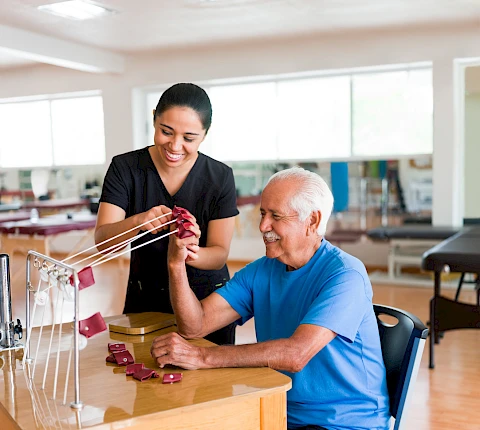
April marks Parkinson's Disease Awareness Month, a time to focus on understanding and managing this progressive neurological disorder. For seniors living with Parkinson’s disease (PD), maintaining independence and quality of life can become more challenging as symptoms progress. Occupational therapy can support seniors with PD, enhance daily routines, and promote continued engagement in meaningful activities, making it crucial in Parkinson's care.
What Is Occupational Therapy?
Occupational therapy aims to help people of all ages engage in the activities they want and need to do through the therapeutic use of everyday activities. While physical therapy focuses on improving physical movement and strength, occupational therapy is about helping individuals perform daily tasks more effectively.
For seniors with Parkinson's disease, this means enhancing their ability to carry out activities like dressing, eating, and moving around their homes. Therapists help seniors develop strategies and adaptations to manage tremors, improve coordination, and conserve energy. This difference in focus allows occupational therapy to cater specifically to the senior’s individual needs, offering a personalized way to maintain their independence.
Occupational Therapy for Seniors With Parkinson's
Occupational therapy for seniors with PD may include exercises tailored to improve balance and coordination, activities that build strength and flexibility, and techniques to aid in easing muscle stiffness. Therapists might use tools like weighted utensils to help with tremors or suggest home modifications to improve safety.
Exercises could include fine motor activities like buttoning clothes or picking up small objects. Such exercises help maintain dexterity and coordination. Just remember to consult your healthcare provider before starting a new exercise routine.
Accessing Occupational Therapy
If you're considering occupational therapy, the first step is to discuss this option with a doctor. Talk to your healthcare provider about the benefits and potential outcomes of occupational therapy. When discussing with your doctor, consider asking the following questions:
- What specific goals should be set for occupational therapy?
- How often should therapy sessions occur?
- Are there any specific therapists experienced with Parkinson's you would recommend?
Finding the Right Occupational Therapist
Ask your doctor for recommendations or use resources like the American Occupational Therapy Association website for lists of certified therapists. When choosing a therapist, consider their experience with Parkinson's disease, their approach to therapy, and the comfort level of the senior in their care.
Senior Helpers is an excellent resource for finding specialized Parkinson's care services. Our skilled team in Murrells Inlet offers expert care to seniors. We aim to provide the best possible support and care to improve the lives of seniors living with Parkinson's.
Get Compassionate Parkinson’s Care and Support From Senior Helpers
Occupational therapy offers numerous benefits for seniors managing Parkinson's disease, from improving daily living activities to maintaining mobility and independence. If you’re considering exploring occupational therapy to enhance your quality of life while navigating PD and would like additional support at home, we can help. Senior Helpers Murrells Inlet provides professional senior in-home care solutions, including personalized care for seniors with PD. Contact us at Senior Helpers Murrells Inlet for more details about our Parkinson's care services and discover how we can assist you in achieving better health and independence in Murrells Inlet, Myrtle Beach, Little River, North Myrtle Beach, and Georgetown.